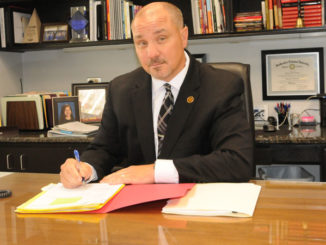
Each year February is designated as American Heart Month. It is a time when the medical community spotlights the number one killer of Americans and Louisiana residents – heart disease.
According to the officials with the American Heart Association, the year the federally designated event is even more important due to the impact of the coronavirus on the public’s heart health.
Dr. Willie Robinson III, an interventional cardiologist at St. Charles Parish Hospital, said more than 11,000 Louisiana residents die each year of heart disease. Common heart-related diseases include coronary artery disease, heart failure, heart attack, arrhythmia (abnormal heart rhythms), valve disease and high blood pressure.
“Each February, we celebrate heart health awareness through American Heart Month and encourage family members to have important conversations about heart disease prevention that can result in heart-healthy behavior changes,” Robinson said.

Robinson said especially dangerous are common misconceptions patients believe about their heart health, including that they are too young for heart disease.
“While your risk for heart disease does increase with age, younger people are still affected too,” he said. “Rising obesity rates in younger people mean that we are developing heart disease even earlier than ever before. Leading an unhealthy lifestyle, having diabetes or being born with a heart condition also puts you at risk.”
Robinson said another common misconception many people have is that they are not having a heart attack as long as they are not having chest pain.
“Chest pain might be the most common symptom of a heart attack, but it’s not the only one,” Robinson said. “Many women in particular have a heart attack without any chest pain at all.”
Robinson said individuals should be aware of other common heart attack symptoms, such as shortness of breath, nausea or vomiting, back or jaw pain, dizziness or fainting, pain in the upper abdomen and extreme fatigue.
Another common heart-related myth, Robinson said, is that it is dangerous to exercise after a heart attack.
“Exercise is essential to recovering after a heart event,” Robinson said. “People who engage in regular physical activity and make other heart-healthy changes after a heart attack live longer than those who don’t. Under the guidance of a cardiologist and rehab program, you should return to physical activity as soon as possible.”
To improve heart health, Robinson encourages patients to exercise, refrain from smoking, eat a healthy diet, know their family history of heart disease and communicate that with a doctor and to get regular, annual check-ups with a primary care physician.
“Your primary care doctor’s job is to help prevent serious health issues,” Robinson said. “If you begin developing heart problems, they can refer you to an interventional cardiologist like myself, and we can all work together to come up with a treatment plan to keep you healthy.”
Robinson said because kids become accustomed to the behavior they see from their parents, it is important to involve them in eating healthy, staying active and making good health decisions.





Be the first to comment